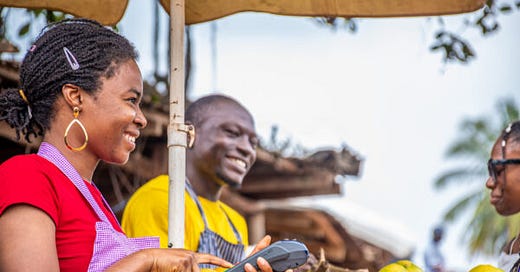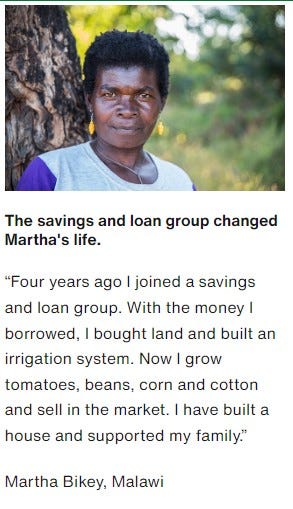Economic Inclusion: The Next Step in Financial Inclusion
Empowering all to thrive in the financial landscape
Thank you to our partners
Greetings!
In recent years, there has been a paradigm shift from mere financial inclusion to a more comprehensive approach known as economic inclusion. Financial inclusion has been a major focus of development organisations and governments for the past few decades. While financial inclusion focused on bringing the unbanked and underserved into the formal financial system, economic inclusion aims to empower individuals with better access to credit, wealth creation opportunities, and economic viability. In this first installation of our expose on economic inclusion, we delve into its importance, exploring insights to highlight its viability and potential impact.
How it started. The goal of financial inclusion is to ensure that everyone has access to basic financial services, such as bank accounts, loans, and insurance. In Nigeria, the apex bank released a recent report that they’ve only been able to achieve 64.1% of financial inclusion as of 2023 and targeted 94% by 2024.
How it is going. In recent years, there has been a growing movement to move beyond financial inclusion to economic inclusion. Economic inclusion goes beyond just having access to financial services. It also means having the opportunity to use those services to create wealth and improve one's economic well-being.
According to IM Sweden;
“Economic inclusion is about giving marginalized groups the means to be in control of their own economic life and helping them improve their economic situation while at the same time improve their status.”
Economic inclusion means that all consumers have access to safe, secure, and affordable financial products and services. Ownership of a transaction account is a first step toward economic inclusion. Transaction accounts at insured depository institutions offer consumers a safe place to keep deposits, conduct financial transactions, and build savings. - FDIC
Taking a shot from Emeka Ajene - owner of Afridigest;
99% of bank accounts in Nigeria contain less than ₦500,000 (~$625).
97% of bank accounts in Kenya contain less than Sh100,000 (~$700).
93% of bank accounts in Uganda contain less than Sh1,000,000 (~$275).
Financial inclusion & access are important, but they don't magically create wealth.
Zooming in. Financial Inclusion isn’t a failure. Financial inclusion has made significant strides, expanding the reach of banking services to millions of previously excluded individuals. However, merely having a bank account does not guarantee financial stability or prosperity. Economic inclusion seeks to address this gap by equipping people with the tools and resources they need to thrive economically.
There are a number of reasons why economic inclusion is important.
First, it can help to reduce poverty. When people have access to financial services, they are better able to save money, start businesses, improve their lives, and invest in their education and training. This can help them to lift themselves out of poverty and improve their standard of living.
Second, economic inclusion can help to boost economic growth. When people have the opportunity to create wealth, they can spend more money and invest in businesses. This can lead to increased economic activity and job creation.
Economic inclusion should help boost the income and assets of more people - individuals and households, with a “big push” of coordinated interventions – usually a combination of cash or in-kind transfers, skills training or coaching, access to finance, and links to market support. - World Bank
Third, economic inclusion can help to reduce inequality. When everyone has the opportunity to participate in the economy, it helps to create a more level playing field. This can help to reduce social unrest and conflict.
Zooming Out. Economic Inclusion is a step forward. There are a number of things that can be done to promote economic inclusion. One important step is to make financial services more accessible to people who are currently excluded. This can be done by expanding the reach of banks and other financial institutions, and by developing new financial products and services that are tailored to the needs of marginalized groups.
Another important step is to provide people with the skills and knowledge they need to use financial services effectively. This can be done through education and training programs, and by providing access to mentors and other resources.
Finally, it is important to create an environment that is conducive to economic inclusion. This means providing access to markets, removing regulatory barriers, and promoting fair competition.
Economic inclusion is a complex challenge, but it is one that is worth pursuing. By making financial services more accessible and providing people with the skills and knowledge they need to use them effectively, we can help to reduce poverty, boost economic growth, and reduce inequality.
Here are some statistics and reports that support the viability of economic inclusion:
A study by the World Bank found that financial inclusion can reduce poverty by up to 10%.
A study by the McKinsey Global Institute found that economic inclusion could add $28 trillion to the global economy by 2025. [LINK]
The United Nations Sustainable Development Goals (SDGs) include a goal on financial inclusion, which aims to ensure that everyone has access to affordable and accessible financial services by 2030.
Economic inclusion is a critical issue in our present reality. By making financial services more accessible and providing people with the skills and knowledge they need to use them effectively, we can help to reduce poverty, boost economic growth, and reduce inequality.
If you are interested in learning more about economic inclusion, there are a number of resources available online and in libraries. You can also contact your local development organization or a government agency to learn about what is being done in your community to promote economic inclusion.
*This series is made possible and powered by our friends - Moor Pay.
Moor Pay is advancing economic inclusion in Africa and other emerging markets. Join its Telegram community and waitlist.
www.sendwithmoor.com
For Partnerships, Adverts, and Sponsorships, send us an email - at giantaffairs@gmail.com OR call - 08074727030 | See Africa Tech Memo Ad Rate
For Support, use the link below:






